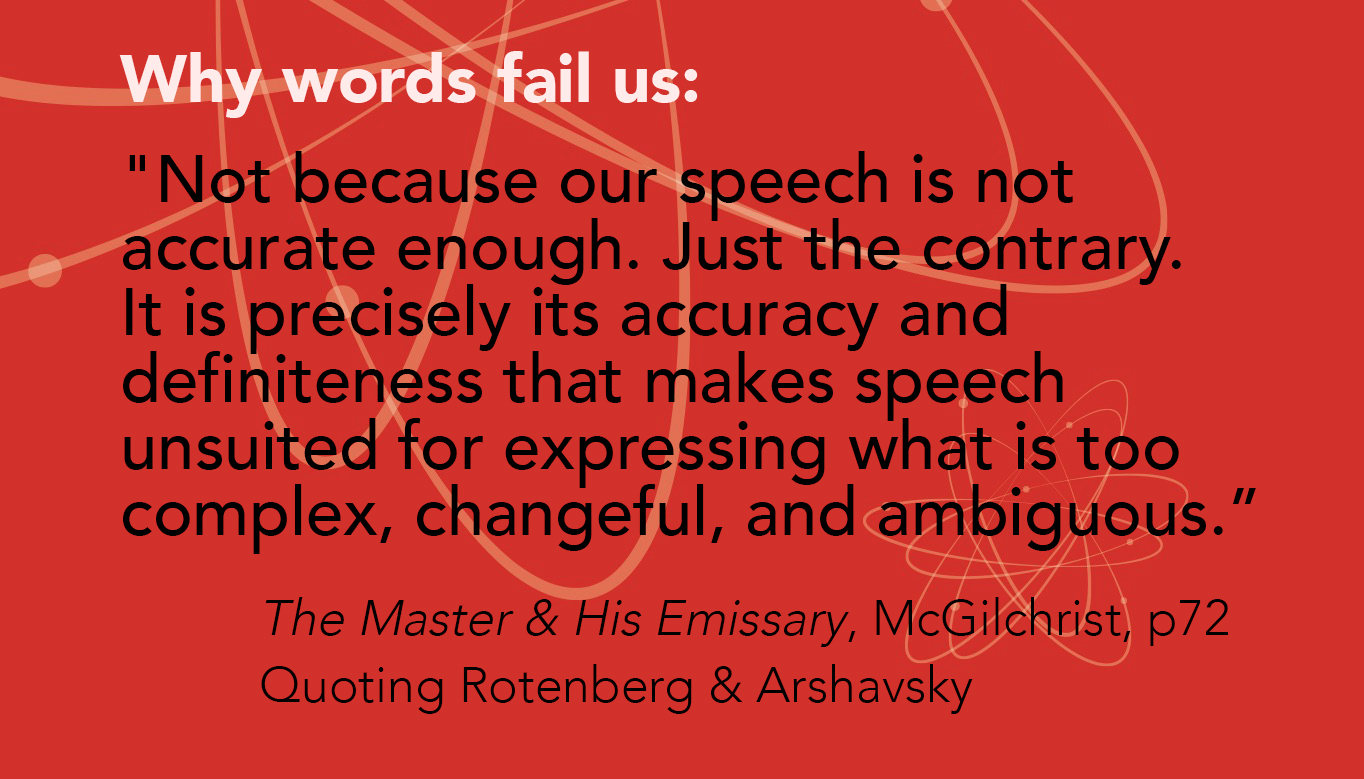
Complexity vs Precise Language in Business

About a year ago I wrote about ontologies in psychology and how the unacknowledged assumptions of “substance ontology” had led late 20th century work to its failure to comprehend individuals. A friend of mine, a practicing psychologist who had started a local university psychology program, had alerted me to the problem as he was frustrated by the failure of academic work to be of any value when treating individual human beings.
I recommend investigating the process approaches which are developing in a range of social sciences based on complexity. But rather than continue along that path, the idea of ontology raises a critical issue: Many assumptions are taken up by those doing business without knowing they ARE assumptions.
Assumptions of Precise Definitions
Humans evolved to guide our actions based on ways we expect the world works. As a result, we take up assumptions about how the world works without thoroughly investigating the ideas. In part, these assumptions help us find comfort in a world of uncertainty — especially if they are right most of the time. This leaves us, though, believing much about how the world works which is not entirely right.
Consider how these assumptions develop. Even young humans, after all, are not blank slates so none of us choose most assumptions we take up based on logic and rationality. Chris Mowles notes “we are born into a world where there is already a play going on.” (Complexity, Chris Mowles, Routledge, ©2021). Having been born into this play, then, we observe even from a very young age how those around us work and absorb many of their assumptions without knowing we have done so. Our human slates, then, become cluttered with assumptions before we even know what an assumption is. And we continue to take on assumptions throughout life.
Let’s consider a specific assumption about words:
Businesses assume anything which matters can and should be described with words — and that those words must define those things in precise ways.
Some reading this may think of training — perhaps at the university — telling them that unless an idea is clearly defined it cannot be known or studied. Certainly, this training is common in sciences, engineering, and business science.
But while the idea is taught at university, it is merely the extension of a deeply buried assumption which started in childhood. As a child attempts to understand the world around them they must learn how to rely on the words of parents, siblings, teachers, and others. From the moment we are born, then, a process begins where we attempt to sort out connections between words and meaning.
As soon as we reach schooling in the Western world this process intensifies — especially as we are introduced to dictionaries as the repository of meaning for words. Before any student is 10 years old, then, they have taken up a belief that words have specific and precise meanings and that making their way in life requires using words with knowledge of those meanings. Of course, the degree to which an individual is able to do this depends on their individual make-up, their socio-economic status, their upbringing, and many other influences. Yet the belief that words have specific and precise meaning carries on with us through life. Eventually it is further developed through exegesis — critical explanation or interpretation of a text. Such interpretations break texts into parts and dissect individual word meanings as with religious texts, poetry, or fiction.
Eventually, those who study science, engineering, or business science encounter directly a demand that all ideas be specifically and precisely defined.
And, yet…
The Error of Precise Definition
“The act of defining is the act of death.” True, god, that’s real, the curse of naming and defining things like “environment” and “indigenous.”
Right Story, Wrong Story, Tyson Yunkaporta, ©2023
My last three posts looked at differentiation — the idea that all products, and possibly brands, should be made intentionally different. The word “differentiation” is a conceptual word attempting to capture a whole idea.
My background work found an article by Byron Sharp and John Dawes of the Ehrenberg-Bass Institute. (“What is Differentiation and How Does it Work?” Journal of Marketing Management, 2001,17) With useful thoroughness, they searched the literature yet found that “The term is usually used without reference to any formal definition, and there exist a number of alternative definitions, along with non-complementary operationalisations/measures.”
Reviewing the list of definitions they discovered, what I took away was that the authors of the definitions (not Sharp and Dawes) were working so hard to precisely define the term “differentiation” that none of them accurately described differentiation as a useful tool. I suspect this is why Sharp and Dawes did not find formal definitions in common use.
For a word as conceptual as differentiation, as Tyson Yunkaporta observes, the process of precise definition can be a process of death. In such cases, the more narrowly and precisely we define the idea, the less our words represent the idea. Highly precise definitions can be quite damaging.
It’s not that precise definitions are always wrong. Rather, there are many times they are not productive, necessary, or safe.
There are Many Types of Definitions — Only Some Should Be Precise
The world of language is far too rich to be minimized into only one or two types of words. There is value, though, in offering a tension between two types in order to learn more. So consider the following two types of ideas — one should be precisely defined while precision damages the other..
- Words attempting to capture big concepts or ideas. Such words must be filled with ambiguity for ideas like “environment,” “indigenous,” “liberty,” or “freedom.” When we demand precision we do great damage to the ideas. Such is the case with the word “differentiation.” Product difference, after all, is an idea. Demanding precise definition prevents creating products customers find different in meaningful enough ways to create economic value (e.g. profit) for the company.
- Words labeling specific measures. When we are working with specific measures, highly precise definitions are required without question. Thus, someone looking at a report of “conversion rates” must know the exact and specific definitions of the numerator and denominator used to calculate the rate.
Businesses must learn to live with ambiguity around some very important words and demand excellent precision around others. But while living with ambiguity is commonly a reality in liberal arts, it violates many premises of both engineering and business science.
Interestingly, in her book Babel, RF Kuang makes a fascinating plot element out of the inherent tension between words describing similar ideas in different languages. Such tension led Umberto Eco to suggest “translation is the art of failure.” A translation, then, must attempt to capture the whole meaning of what was written or said — not simply a one-to-one correlation between words.
I once observed that only the silence of ambiguity gives room for important truth to emerge — partly because words often fail us because of their precision.
Complexity and Definition
[J]ust as the quark is a symbol of the physical laws…the jaguar is … a possible metaphor for the elusive complex adaptive system, which continues to avoid a clear analytical gaze, though its pungent scent can be smelled in the bush.
The Quark and the Jaguar, Murray Gell-Mann, ©1994
The conventional scientific paradigm depends heavily on definition because it is a paradigm of dividing and conquering. Making a definition precise requires we divide and conquer by clarifying what a term does not refer to as well as what it does refer to. In situations, then, where the conventional scientific paradigm holds, such definitions are critically important, highly valuable, and exceptionally useful.
Amid complexity, though, reduction misleads because it severs the connections which are critical to understanding that which is complex. Precise definitions also always sever connections as they eliminate what a term does not refer to. Within complex situations our focus is detecting whole results and the patterns of those whole results — whole results which emerge. We also cannot know what patterns will emerge by studying specific individual behavior of parts — no matter how precisely defined. We know the patterns only through the difficult and indirect challenge of observing what emerges — the difficulty Murray Gell-Mann describes.
In my teaching I illustrate the ambiguity of a “whole result” by showing photos of our dog Ellie (of which I include two here). The class is then asked which photo captures Ellie’s “whole” being. None do. In fact, the entire set of photos can only help develop a sense of what she might be but cannot represent her “whole.” Attempting to precisely define idea words also fails to capture whole meaning.
To perceive complex whole results, then, we must allow ambiguity. A term which helps with this ambiguity is Robert Heinlein’s idea of “grok” — as in “do you grok the whole result?”. It allows us to talk without precision yet also with great common and shared comprehension. (He introduced the term in 1961’s Stranger in a Strange Land. I’m saddened that Elon Musk has taken it away from Heinlein to title his AI.)
Embracing The Range of Definitions Needed
To offer a few ideas in closing:
- It is quite unnatural to demand humans precisely define every word. This violates how we have evolved and how humans thrive.
- Evolution has given humans a natural ability to work with ideas which are ill-defined — to work effectively amid ambiguity.
- Businesses need to develop a sense for when precise definitions are valuable and when more ambiguous definitions are critical.
- Businesses need to be comfortable with ambiguity as ambiguous definitions are often those which most accurately capture broader patterns — the patterns we must understand to grasp new opportunities.
There is a last very important thought to consider: A great deal of business relies on statistics and numeracy. Doing this, though, requires that we work with very specific definitions which means much which matters in doing business cannot be measured or analyzed with statistics because it is, inherently, too ambiguous.
My next post will carry on with ideas of precision turning to look at errors in the demand that goals also must be precisely defined.
Until next time, be well.
©2025 Doug Garnett — All Rights Reserved
Through my company, Protonik LLC, I consult with companies as they design and bring to market new and innovative products. I am writing a book exploring the value of complexity science for driving business success. Protonik also produces marketing materials including documentaries, websites, and blogs. As an adjunct instructor at Portland State University I teach marketing, consumer behavior, and advertising.
You can read more about these services and my unusual background (math, aerospace, supercomputers, consumer goods & national TV ads) at www.Protonik.net. Roughly once a month, Shahin Khan and I discuss current issues in marketing on our podcast The Marketing Podcast available on Google, Spotify, the OrionX website, and Apple Podcast.
Categories: Business and Strategy, Complexity in Business



